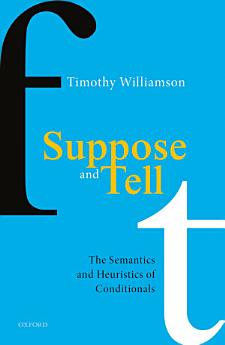Suppose and Tell: The Semantics and Heuristics of Conditionals
Jul 2020 · Oxford University Press
Ebook
288
Pages
family_home
Eligible
info
reportRatings and reviews aren’t verified Learn More
About this ebook
What does 'if' mean? It is one of the most commonly used words in the English language, in itself a sign to the importance of conditional thinking to human cognitive life. We make conditional statements, ask conditional questions, and issue conditional orders. We need to think and talk conditionally for many purposes, from everyday decision-making to mathematical proof. Yet the meaning of conditionals has been debated for thousands of years. Suppose and Tell brings together ideas from philosophy, linguistics, and psychology to present a controversial new approach to understanding conditionals. It argues that in using 'if' we rely on psychological heuristics, methods which are fast and frugal and mostly, but not always, reliable. As a result philosophers and linguists have been led astray in theorizing about conditionals through trusting faulty data generated by such methods and prematurely rejecting simple theories on the basis of merely apparent counterexamples. This book shows how one such simple theory of conditionals can explain the data, and draws wider implications for the nature of meaning and its non-transparency to native speakers, vagueness in thought and language, and the need for semantics to attend to the unreliable heuristics underlying our judgments.
About the author
Timothy Williamson is Wykeham Professor of Logic at the University of Oxford and Whitney Griswold Visiting Professor at Yale University. He has also taught at MIT, Princeton, Edinburgh, Trinity College Dublin, Chinese University of Hong Kong, and elsewhere. He works on logic, philosophy of language, epistemology, metaphysics, and metaphilosophy. His books include Doing Philosophy, Tetralogue, Modal Logic as Metaphysics, and The Philosophy of Philosophy. He is a Fellow of the British Academy, Foreign Honorary Member of the American Academy of Arts and Sciences, and Member of the Academia Europaea.
Rate this ebook
Tell us what you think.
Reading information
Smartphones and tablets
Install the Google Play Books app for Android and iPad/iPhone. It syncs automatically with your account and allows you to read online or offline wherever you are.
Laptops and computers
You can listen to audiobooks purchased on Google Play using your computer's web browser.
eReaders and other devices
To read on e-ink devices like Kobo eReaders, you'll need to download a file and transfer it to your device. Follow the detailed Help Center instructions to transfer the files to supported eReaders.







